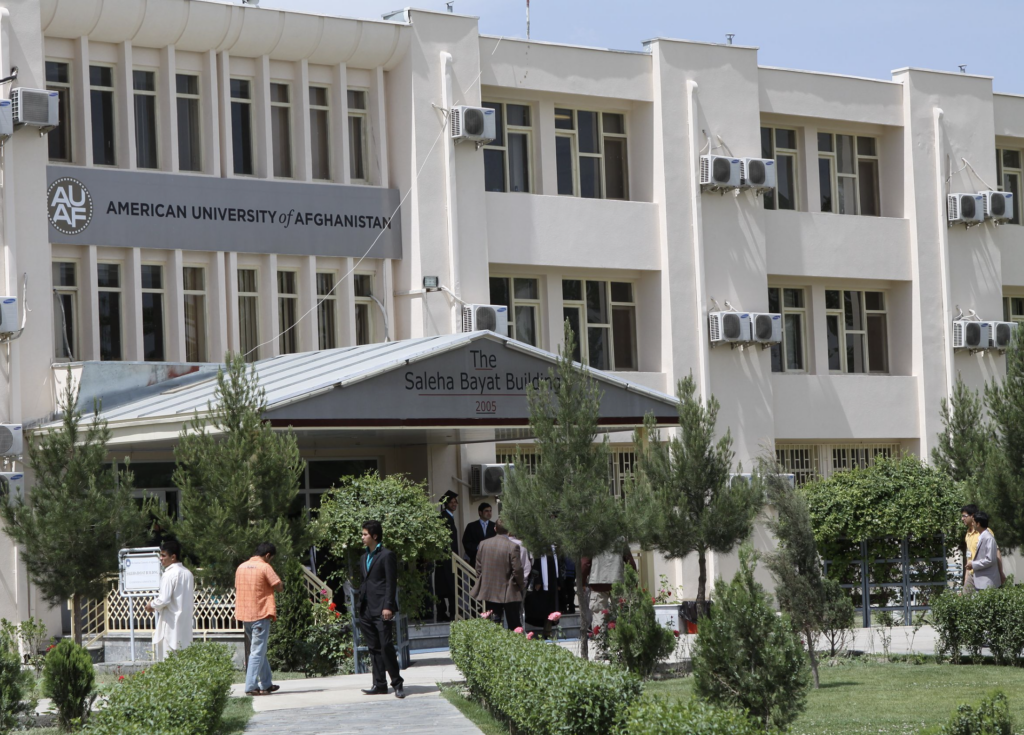
Hana has been in hiding in Afghanistan for two years.
She made the decision after she received a threatening letter from the Taliban accusing her of working for foreigners and stating that her “death warrant (was) issued.” Her family joined her in hiding after men came looking for Hana at their home. We are using a pseudonym and withholding personal details to protect her and her family’s safety.
“These incidents and these declarations put us — put me — in a very difficult situation in Afghanistan. I wouldn’t dare to step one foot outside,” she said.
The Taliban entered Kabul on Aug. 15, 2021. They swiftly took power and began targeting people they viewed as enemies of the regime — including Afghans with American educations, such as Fulbright scholars.
Hana is one of them. She agreed to speak to me through an encrypted app in the early hours of the morning, while her neighbors were still asleep.
For Hana, becoming a Fulbrighter was a longtime goal.
Fulbright is a prestigious cultural exchange program run by the U.S. State Department. Among other things, it offers scholarships that allow students from all over the world — including Afghanistan — to study at American universities. Hana explained that despite social and cultural norms that discourage young, single women from traveling alone, she was determined to come to the U.S. to study, and hoped to use what she learned to build a career and to advocate for women’s rights in Afghanistan.
Now, that achievement has put her in danger.
Being in hiding this long has taken a severe toll on Hana and her family. She said that they live in constant fear of being found by the Taliban. Stuck inside with little to do but worry, even sleep doesn’t bring much relief.
“Believe me,” she said, “they will chase you even in your dreams.”
Hana’s situation is not unique. Mustafa, a former professor at the American University of Afghanistan, is also Fulbright scholar. When the Taliban took Kabul, he and his family fled to a small village, far away from anyone who might recognize them.
“I, along with my family, live in a small mud house with no proper electricity and with almost no access to the internet and other basic needs of life,” he said. “Our kids are deprived of education, and we fear torture, kidnapping and killing at any moment.”
While in hiding, Hana and Mustafa have found an unlikely lifeline: Tennessee Resettlement Aid, a small nonprofit based in Nashville that has taken up their cause.
Saleem Tahiri, who left Afghanistan with his family about five years ago, is one of its founders. He said that Afghan Fulbrighters represent an important cultural and political relationship.
“They were the bridge between the U.S. government and Afghanistan government,” he said.
Co-founder Katie Finn pointed out that they’re also highly-educated scholars who could potentially benefit the U.S. and, later, a post-Taliban Afghanistan.
“If we leave them to die, nobody wins. If we bring them here and keep them safe, maybe they can return and end up helping others,” she said.
Tennessee Resettlement Aid is in touch with nearly 40 Afghan Fulbrighters. Most are in hiding and looking for a way out. Some have already fled to neighboring countries and started the asylum application process. But visas can take years to get approved, and not everyone can afford to wait that long.
“So, essentially, you’ll be stranded in one of these other countries where you may also not know anybody, and you have no money,” Finn explained.
Finn and Tahiri host regular calls with the Fulbrighters to check in with everyone. They’ve raised money, brought in a lawyer to answer questions about visa applications and have tried to help scholars who have relocated to Pakistan or Tajikistan find remote work to support their families.
They’ve also been collecting testimonials from the scholars in support of a bill in Congress, which would give these Fulbrighters Special Immigrant Visas (or SIV).
That bill was introduced by Rep. John Garamendi, D-CA, who is a senior member of the House Armed Services Committee.
He first heard about this issue from professors at the University of California Davis, who had received pleas for help from Fulbrighter alumni in Afghanistan. Currently, only Afghans who were connected to the American war effort — through the military, State Department, or NGOs — are eligible for SIVs, which provide an expedited path to resettling in the U.S..
“We found that we could do virtually nothing because many of these Fulbright scholars had no specific relationship to the American war effort, and therefore did not qualify for the special visa,” he said.
Garamendi’s bill would change that.
“These Fulbright scholars continuing to live in Afghanistan were at serious risk because they were associated with America,” he said. “We’ve been trying to get this done now for far too long. This should have been a no-brainer.”
The Fulbright Program has not responded to requests for comment for this story.
Hana hopes that sharing her story will help raise awareness of what Fulbrighters are facing in Afghanistan.
“We want the U.S. government to know that we expect them to not let us die in the rusts and remains of this broken system just because we had an American education,” she said.
Before the Taliban took power, Hana played the harmonium in a band. She shared several songs, but the recordings are now years old. These days, she explained, it’s too much of a risk for her to practice, even indoors.
The Taliban has outlawed playing music in public and burned instruments. Still, Hana dreams of one day being able to perform on stage again.

